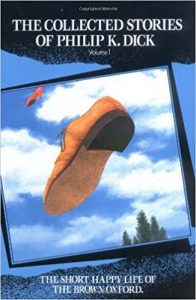The Short Happy Life of the Brown Oxford and Other Classic Stories (The Collected Stories of Philip K. Dick, Vol. 1)
Stories written by Philip K. Dick
At this moment, Philip K. Dick feels like another piece of the cultural pie forced into the common parlance because he was adored by lovers of science fiction and comic books. In both cases, it took one hugely successful film to leave us saturated with super-heroes and science fiction based on questioning the nature of reality. For comic books, it was the first X-Men movie and for Dick, it was Blade Runner. There has been no escape from either ever since.
If you zipped back in time and told me as a youth that I would see so many such films, then I would have happily awaited the day, certain that it would mean a better world for everyone where we understood the positive mythology of superheroes and the cautionary tales of PKD. Of course, superheroes have become props for blockbuster films aimed to generate massive amounts of cash as quickly as possible while remaining as forgettable as possible so that we look forward to the next fix without too much trepidation.
Come to think of it, that sounds like something Philip K. Dick would dream up.
Or maybe not. Check it out yourself. His short stories have been lovingly collected in highly readable volumes. They are a nice dip into some wonderful science fiction of Fifties and Sixties written by someone who was fast enough to crank them out and brilliant enough to make you forget how many he wrote so quickly.

As much as anything,
PKD provided high entertainment value. One of the ways he did this was to rely on some standard themes, which he masterfully altered and evolved. The short stories often feel more concrete than his novels.Let’s face it, one of the appeals of adapting PKD to the screen is that he gives you a plot that can be defined in conventional terms surrounded by various twists of the lunacy dial. Blade Runner feels like an exception in that the film feels almost more unconventional than the book, Do Androids Dream of Electric Sheep?. Or maybe that’s the secret to the desire to bring PKD to the screen? Directors can demonstrate their own creativity by expanding on the initial weirdness provided by the story.
Ultimately, some artist had to capture the general zeitgeist of dystopian angst built up around our growing technological and pharmaceutical dependencies. Maybe we’re still too close to him in time to truly appreciate his importance. Maybe it is simply the curse of science fiction that once the predictions feel dated, then we move on to the next artist with a reconstituted vision built on more current knowledge.
What’s it all about?
You’ve Got to Check This Out is a blog series about music, words, and all sorts of artistic matters. It started with an explanation. 106 more to go.
New additions to You’ve Got to Check This Out release regularly. Also, free humor, short works, and poetry post irregularly. Receive notifications on Facebook by friending or following Craig.
Images may be subject to copyright.